QUEEN VICTORIA’S LAST LOVE!
Diamond Jubilee almost derailed by Queen’s "love" for [an Indian] Muslim boy.
By EMILY FAIRBAIRN
Published: 23rd April 2012
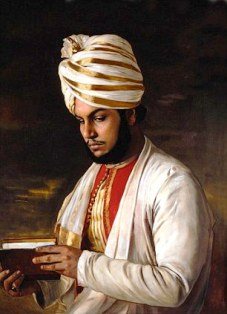
The Diamond Jubilee of Her Majesty Queen Elizabeth II brought all the pomp and circumstance of a splendid British royal celebration. But just over a century ago the same celebration for her great-great-grandmother, Queen Victoria, was nearly derailed by her scandalous relationship with an Indian manservant.
In fact Her Majesty became so infatuated with tall, handsome Muslim Abdul Karim that senior royal advisers plotted to have her declared insane just days before her Jubilee unless she halted a controversial plan to knight him.
The young waiter he was just 24 had begun serving the Queens table in June 1887 after being sent to London as a gift from the Indian outpost of her empire. He soon began bewitching her with romantic tales of mysterious India, and cooking up delicious curries for her in the royal kitchens.
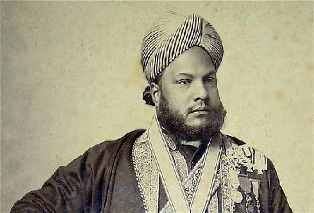
But royal biographer Jane Ridley believes Abdul’s striking looks also helped to draw in the Queen. She says: ‘Victoria always had a great appreciation of male beauty so when she saw these gorgeous clothes, sashes and turbans kissing her feet, how could she resist?’
Victoria soon promoted Abdul from waiter to her personal teacher or Munshi and after he began to teach her a few words in Hindi the pair grew ever closer.
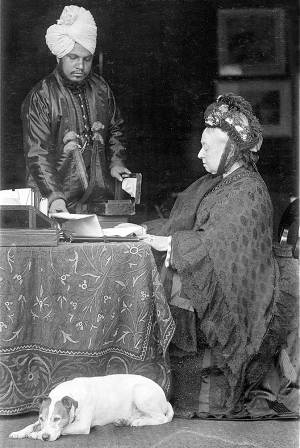
Royal loyal ... Abdul and Queen Victoria in the 1880s
She had been starved of affection since the death of her beloved husband Albert in 1861, and Abdul Karim’s great-grandson, Javed Mahmood, says it is not hard to see why she fell for his great-granddad.
He says: ‘Abdul was a very warm man. He was very jolly, entertaining a very human person. Maybe those were the traits that attracted the Queen eventually, because he came across as a man of flesh and blood, and she wasn’t used to real people around her.’
But as is revealed in the TV documentary Queen Victoria’s Last Love their growing intimacy did not go down well in the strictly hierarchical world of the royal household.
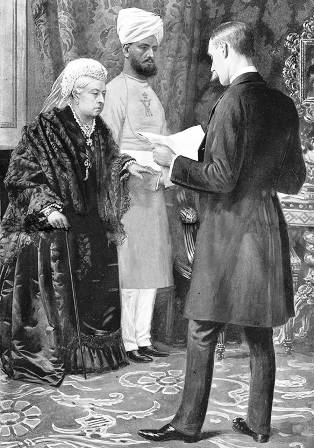
Together ... Queen Victoria and her manservant, Abdul
By 1894, Abdul was elevated to the position of Her Majesty’s Indian Secretary making him an official member of the inner circle. Jane Ridley says: ‘The idea that a servant, an outsider who has none of this pedigree or background, could suddenly leapfrog into a position of great closeness with the Queen is something courtiers found not just threatening, but wrong.’
It wasn’t just Abdul’s class that troubled the Queen’s advisers. They were also scandalized by his race. But the more the royal household attacked Abdul, the more the Queen defended him. She fired off an angry memo to her Private Secretary, Sir Henry Ponsonby, saying: ‘As for Abdul Karim, the Queen cannot praise him highly enough. He’s zealous and attentive, a thorough gentleman.’ The royal household hit back by sending investigators to India who came back with alarming information about Abdul’s origins.
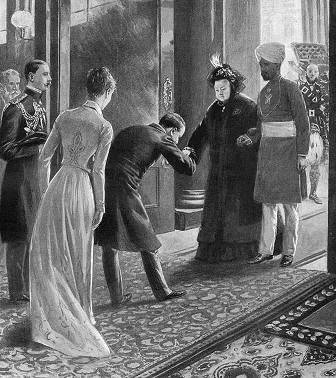
Gentleman greets Queen Victoria as she stands with Abdul
He was not, as he had claimed, the son of a high-flying Army doctor. In fact, his father was a lowly pharmacist who worked in Agra jail where Abdul himself had worked as a mere clerk.
But the revelation only served to push the Queen closer to Abdul.
She took a stance that was astonishing at the time, accusing her household of racial prejudice.
In a memo to Sir Henry she wrote: ‘To make out [that] the Munshi is low is outrageous. Abdul feels cut to the heart to be thus spoken of. The Queen is so sorry for the poor Munshi’s sensitive feelings.’
Rumors started to circulate that Abdul was passing Victoria inflammatory advice about India, and that he was a spy leaking secret foreign policy information. She responded by becoming even more intimate with him. When he became ill she would spend long periods in his bedchamber, fluffing his pillows and stroking his hand.
Then in 1897, with just weeks to go until Victoria’s Diamond Jubilee, the Queen announced she planned to knight Abdul.
The bombshell was one step too far for her ministers and attendants.
The Viceroy of India joined forces with the Prime Minister to oppose the move. In response, Victoria threatened to pull out of the Jubilee celebrations.
With the biggest event that the British monarchy had ever seen under threat, the Queen’s eldest son, Bertie, later Edward VII, stepped in. He hatched a plan with the Queen’s doctor, Sir James Reid, who wrote to her, saying: ‘There are people in high places who know your majesty well and say to me the only charitable explanation that can be given is that your majesty is not sane, and that at some time it will be necessary for me to come forward and say so. I have seen the Prince of Wales yesterday and he has said he is quite ready to come forward, because it affects the throne.’
Victoria had to admit defeat and Abdul did not get his knighthood.
But he was constantly by her side for the Jubilee celebrations. For the remaining four years of Victoria’s life, she was inseparable from her beloved servant.
When she finally died in 1901, the protection Abdul had enjoyed came to a sudden end.
Just days after the funeral, the royal householders marched into Abdul’s home, seized all items bearing the royal crest and burned all his precious letters from the Queen.
He was exiled to India where he survived eight years, and died at the age of 46and only God knows whether he died a natural death or at the instance of the British.
[Deja vue - Dodi Fayed and Diana?]
Watch the entire story as shown on TV